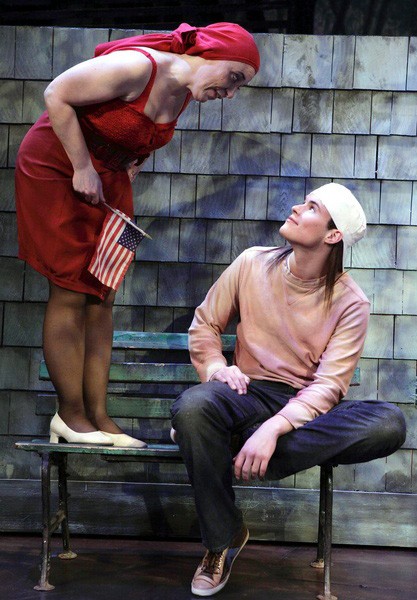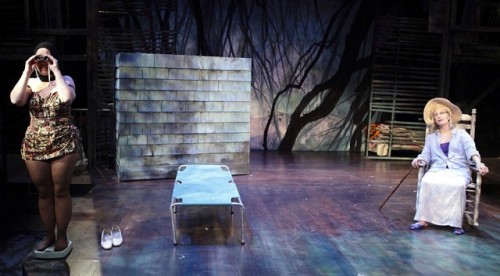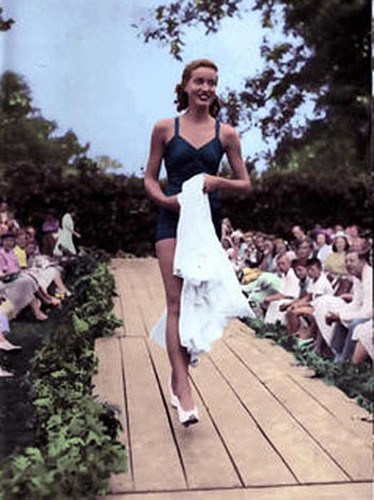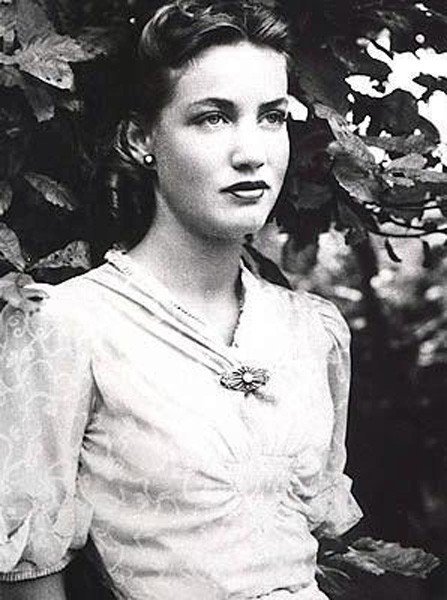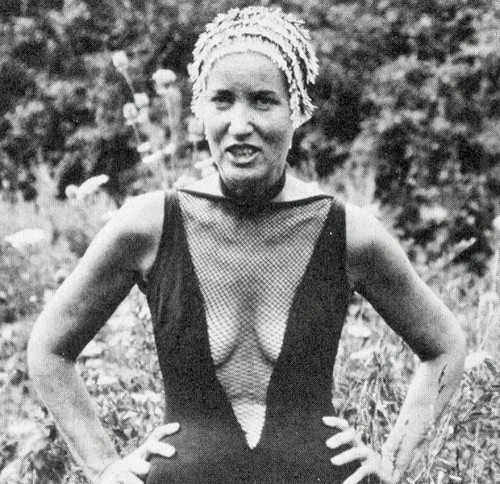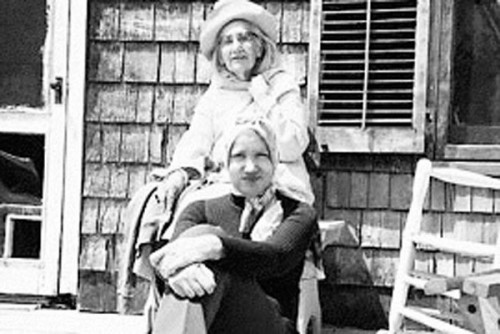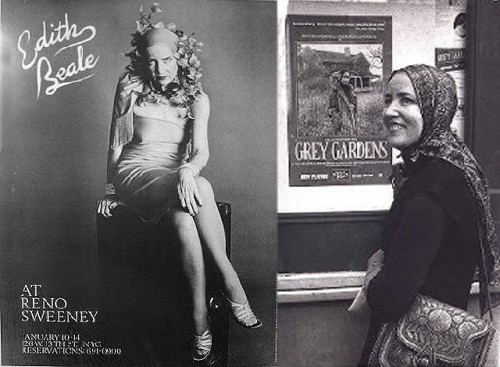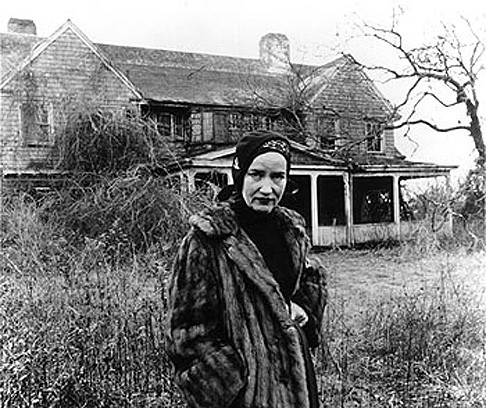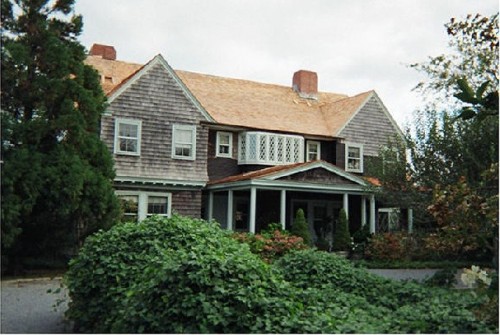A Spellbinding Grey Gardens Rises at Boston's Lyric Stage Company
The Prisoners of a Crumbling Estate
By: Larry Murray - May 12, 2009
Lyric Stage Company of Boston presents Grey Gardens, Book by Doug Wright, Music by Scott Frankel, Lyrics by Michael Korie, Directed by Spiro Veloudos, Musical Direction by Jonathan Goldberg, Choreography by Ilyse Robbins, Scenic Design by Cristina Todesco, Costume Design by Charels Schoonmaker, Lighting Design by Scott Clyve, Production Stage Manager, Nerys Powell, Assistant Stage Manager, Cat M. Dunham.
Cast (In Order of Appearance) Prologue, 1973: Edith Bouvier Beale - Sarah DeLima; "Little" Edie Beale - Leigh Barrett. Act One, 1941: Edith Bouvier Beale - Leigh Barrett, "Little" Edie Beale - Aimee Doherty; George Gould Strong - Will McGarrahan; Brooks, Sr. - Steven M. Key; Jacqueline "Jackie" Bouvier - Miranda Gelch; Lee Bouvier - Elise Hana; Joseph Patrick Kennedy, Jr. - R. Patrick Ryan; J.V. "Major" Bouvier - Dick Santos. Act Two, 1973: Edith Bouvier Beale - Sarah DeLima; "Little" Edie Beale - Leigh Barrett; Brooks, Jr. - Steven M. Key; Jerry - R. Patrick Ryan; Norman Vincent Peale - Dick Santos.
Orchestra: Keyboard -Jonathan Goldberg; Bass - Hessu Eisdorfer; Drums/Percussion - Desiree Glazier; Reed 1 - Louis Toth; Reed 2 - Wendy Macdonald; Trumpet/Flugelhorn - Paul Perfetti; Violin - Stanley Silverman. Two Acts with one intermission. Running Time Two hours and 30 Minutes. The Lyric Stage Company of Boston, 140 Clarendon Street, 2nd Floor, Boston, MA 02116, 617.585.5678. Through June 6. www.lyricstage.com
Grey Gardens is a fascinating tale of two peculiar women, cousins of the Kennedys, who remained staunch in the face of crushing poverty, and whose dilemma was first brought to light by the now famous Maysles brothers 1975 documentary of the same name. The musical retelling of their sad tale does for the musical theatre what Death of a Salesman did for drama. It shows how dangerous it is to live in a fantasy world of one's own making. Lyric Stage infuses the denizens of Grey Gardens with incredible life even as their stately home and place in society are crumbling to dust. It reflects their mental state, living in denial, bickering over past events, while their once fastidiously clean house fills with cats, raccoons, fleas and a five foot pile of empty cat food cans.Both Edith Bouvier Beale and her daughter, Edie Beal lived lives that can only be described as illusory and theatrical, despite the fact that neither ever set foot on a real stage. Except for brief flirtations with singing, their aspirations were never realized for the simple reason that such "carrying on" simply was not done in their day. "Big" Edie passed away in 1977. "Little" Edie, who was born in 1917, died in 2002 at age 84. She did not have a very happy life.
In the first act, the head of the household, J.V. "Major" Bouvier (Dick Santos) tries to stamp out their dreams, believing that a woman's name should only appear publicly once in a lifetime, in her nuptial announcement. Back then, Boston Herald society writer Rose Walsh actually allowed two more, the birth and death notices.
Times have changed of course. Local society was once limited to the "Boston 400" who were meticulously listed in a Blue Book which became a guide of who was and was not acceptable company. It remains a figment of the imagination for estate born and private school educated families who, given the opportunity, will point out they are descendants of the Puritans. Dreadful people then, and now. This notion of propriety was eagerly served by the powerful society writers which the little guides spawned as New England's arbiters of good taste. Today, as with Grey Gardens itself, only remnants of this pecking order remain. For those who track such things, it seems that these coupon clipping kids have become the carrion that people like Bernie Madoff pick over to enrich themselves.
Grey Gardens has two acts which differ in musical style. Act One takes place in 1941 during Little Edie's glory days when she dates and almost marries Joseph Patrick Kennedy, Jr. (yes, that Kennedy who was shot down in WWII) and Howard Hughes. Big Edie botches the impending engagement, thereby setting Little Edie on a course of dependence on her mother. The songs and dialog in this first half are suggestive of Noel Coward and Cole Porter. Smart, sassy and full of nostalgia.
The second act is almost a different musical, more in the style of Stephen Sondheim, with a darker, more revealing mood. Instead of merriment, the songs expose the thoughts going on inside Big and Little Edie's minds. It is quite a change from Act One. While the songs in the first half are frothy and enjoyable, those of the second half are memorable and tear at your heart. "The Revolutionary Costume for Today" expresses how Little Edie creates her odd ensembles from whatever old clothes are at hand. Big Edie sings "Jerry Loves My Corn" as a paean to her handyman/tenant, Jerry, played by R. Patrick Ryan (who also appears as Joe Kennedy in Act I).
Director Spiro Veloudos clearly encouraged his actors to thoroughly inhabit their roles. At a talk-back after the show it was clear that there was not a single question that was not asked and answered about the Beals and their relatives.
Of course Grey Gardens is ultimately a star vehicle because of its unusual casting twist. The supremely talented Leigh Barrett plays Big Edie in the first act, and Little Edie in the second. Her transformation from mother to daughter is not just successful, it is amazing. The myriad tics and mannerisms she picked up from the documentary footage, right down to the voice inflections, are brilliant. Barrett is the undisputed star of this show.
Even so, no star shines alone, and this is a production with a constellation of great performers. Sarah deLima plays the demanding role of Big Edie to perfection in both the Prologue and Act Two. Will McGarrahan makes a sensational George Gould Strong (Big Edie's paramour) and while his role is small, his wry lines are delivered with perfect timing and understatement.
Also brightening the scene were Miranda Gelch as Jacqueline "Jackie" Bouvier and Elise Hana as Lee Bouvier. Dick Santos who plays Major Bouvier also doubles as Norman Vincent Peale in a spirited Act II show-stopper. R. Patrick Ryan's reading of Jerry was wonderful, and just as affecting as his stammering Joe Kennedy.
There are so many great songs in this show's second act that one can forgive the lightweight pastiche of 40's music in the first half whose main purpose was to convey the early WWII war years. The musical direction by Jonathan Goldberg and six other players was invisible, clean and never overwhelmed the singers. The music and lyrics written by Scott Frankel and Michel Korie reaches its apogee at the end of Act II in "Another Winter in a Summer Town" sung by both Edie and Edith. It encapsulates the long period between seasons in the Hamptons. Those of us who live in the Berkshires, or on Cape Cod, know that feeling all too well.
Perhaps what is most delightful about this musical is how accurately it has brought to life all the idiosyncrasies of Edie and Edith. Even the sets designed by Cristina Todesco reflect the turmoil, through an inside joke, a drop with upside down trees outside the cottage to reflect the topsy-turvy lives within.
It is impressive to see how closely this musical sticks to the facts. There are dozens of carefully embedded references to details that only aficionados of the documentary could appreciate. Like the reference to liver pâté. It was Little Edie's secret act of subversion, spooning out cat food and shaping it into a proper mound, garnished with a twist of lemon. "Mother's pâté."
Edie and Edith were, in essence, the prisoners of Grey Gardens. They were born in the pre-feminist era when women of privilege were not expected to become self sufficient. Not only were they unable to live the lives they wanted, they were crippled by the meager support they received from the men in their lives, and totally incapable of fending for themselves except in the most rudimentary way.
Saddest of all was Little Edie, who was the biggest casualty of Grey Gardens, an unfinished woman who stands before us on the Lyric Stage, consumed by cats, fed upon for decades by her broken mother, all the time wanting to live, and to have her own family. Even in their darkest hour, most of their family turned away, leaving them in squalor and desperation. And while Jackie Kennedy eventually came up with $25,000 to help fix up Grey Gardens, it was quite simply too little, too late.
Little Edie survived this folie à deux for 25 years after her mother died. She finally tried to launch a singing career, appearing on the stage of a New York cabaret some two years later. She was met with less than flattering reviews. In fact, the critics mocked her. She lived out her last years in Bal Harbour, Florida where she swam every day but had few friends and resources. The money promised from the documentary never materialized. And she never lived to see this musical which has won numerous awards and will keep her name in lights for years to come.
If only she could hear the applause.
Quick Link to Lyric Stage Company



